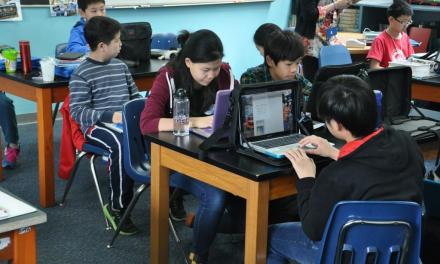Teachers are constantly under pressure to deliver high standards when educating children, but we sometimes forget about their well-being too. With the innovation of EdTech, we take a look at how you can implement better strategies to reduce teacher workload, improve digital efficiency and raise overall well-being.
EDClass spoke to the co-founder and director for business development from EdSmart, Fiona Boyd and discussed the importance of supporting teachers. EdSmart launched in 2014 with its initial ambition to provide a solution to paper-based forms. The company then integrated a more cohesive and efficient way to centralise documents, store them safely and access them with ease and now supports schools globally.
A strong and reliable management information system (MIS) is crucial in today’s education sector. Fiona said:
“Teachers get their degrees and want to become masters of the teacher learning process and they end up becoming administrators around about 30% of their time, which is not great. Data needs to be secure and teachers need instant access whenever needed.”
Let’s delve into three tips on how you can reduce teacher workload and improve productivity and well-being in your school.
1. Embrace technology
EdTech has played a key role in recent years with many advantageous benefits being present. Fiona stated:
“I think it’s going to be mission critical because education is one space that is core to the future of work. If you just look at the cost of living crisis, our economies aren’t working the way they were intended. EdTech is going to be more key than ever and various providers can play in the same sandpit cooperatively.”
Technology can be adaptable and allow teachers to significantly reduce their workload. A supportive MIS can diminish tedious administrative tasks and also keep important documents in a centralised location with easy access. Fiona added:
“A teacher needs technology they can trust. AI and other tools can be great time and cognitive-saving elements. This can be in terms of lesson creation, marking and having more creativity at their disposal. I think too much is thrown at teachers right now. We need to give them some space to design how they want to teach.”
2. Collaborate with a triangulated approach
Having a multifaceted approach by working collaboratively with teachers, parents and students can be instrumental to reducing workload. If everyone is working in unison then it can allow teachers to switch their focus to other areas that require more attention. Fiona said:
“About 68% of parents respond to forms within 24 hours from Ed Smart so schools get responses quicker. It’s all about efficiency and we need to smooth the running of the administration and the connection between teachers, parents and students.”
Collaboration can be pivotal for children to have better educational experiences and outcomes. Simultaneously, teachers can also use innovative systems to improve their work output at a heightened rate. This can allow them to provide better support for children and their families.
3. Use alternative education to reduce workload
At times, the challenges and pressures the education sector delivers can be overwhelming. That is why it is important to experiment with other strategies and types of education that can support teachers, schools and families. However, teachers need credit for the incredible amount of work they do and the turmoil they have to endure. Fiona stated:
“I think it’s time society respected teachers more and gave them the benefit of the doubt. This is because running a classroom and teaching young people is not easy. Teachers are essentially frontline staff and are having to deal with a lot of aggressive behaviour from both students and parents. So, I think teachers are deserving of respect by virtue of the work they do.”
Coinciding with supporting teacher workload, by using alternative means it can alleviate pressure and improve well-being too. This concerns both teacher and student so everyone can benefit. Fiona summarised:
“Technology can play a role in making people feel better and more confident. If you can talk to someone online, a chatbot or avatar who will listen to you and not judge you, it is incredibly powerful.”
Online educational alternative provisions, such as EDClass, can provide teachers with respite and support for their students who may be struggling with mental health or behavioural challenges. This can allow teachers to create more content for students in the classroom and provide pupils who struggle to access mainstream education a different route to education.
EDClass also partners with Wonde to help ease the pressure off schools. This highlights the importance of collaboration and MIS to ensure digital efficiency in the education sector.
To learn more about EDClass call 01909 568338, send an email to mail@edclass.com or enquire for more information here.












